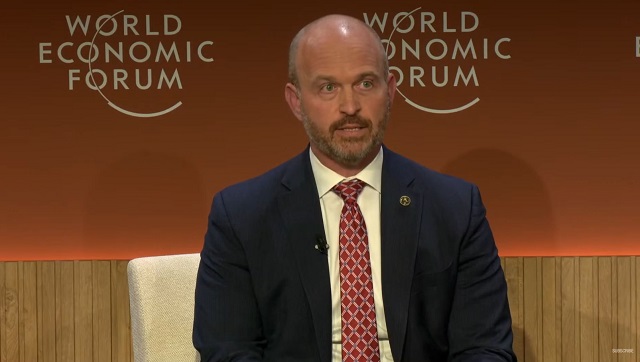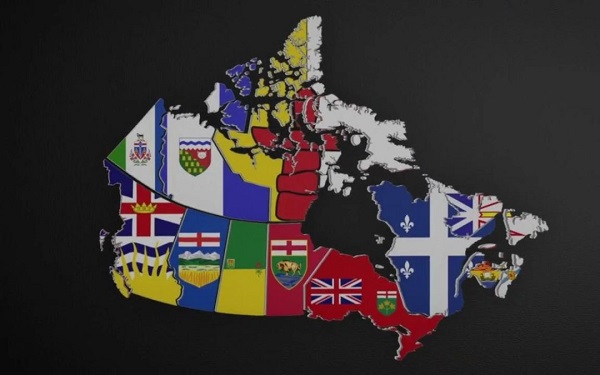Economy
Heritage Foundation president tells Davos: Future Trump admin must reject all WEF ideas

Heritage Foundation President Kevin Roberts at the World Economic Forum meeting in Davos
From LifeSiteNews
The Heritage Foundation’s Kevin Roberts said that everyone in the next administration must ‘compile a list of everything that’s ever been proposed at the World Economic Forum’ and object to ‘all of them, wholesale.’
The president of the conservative Heritage Foundation in said in his appearance at Davos that the next Republican administration needs to reject “everything that’s ever been proposed at the World Economic Forum.”
Kevin Roberts, head of the Heritage Foundation, the leading conservative think tank in the U.S., said during a panel discussion called “What to Expect from a Possible Republican Administration?” that “the kind of person who will come into the next conservative administration is going to be governed by one principle and that is destroying the grasp that political elites and unelected technocrats have over the average person.”
BREAKING – @Heritage President @KevinRobertsTX calls out globalist elites at WEF
He said the next Republican administration needs to “compile a list of everything that’s ever been proposed at the World Economic Forum and object [to] all of them, wholesale.” #WEF24 pic.twitter.com/DXmlZUoCOA
— Andreas Wailzer (@Andreas_Wailzer) January 18, 2024
“And if I may, I will be candid and say that the agenda that every single member of the administration needs to have is to compile a list of everything that’s ever been proposed at the World Economic Forum and object [to] all of them, wholesale.”
“Anyone not prepared to do that and take away this power of the unelected bureaucrats and give it back to the American people in unprepared to be part of the next conservative administration.”
Trump admin will ‘trust the science’ and reject push of gender ideology
Roberts said that the idea that the WEF is defending “liberal democracy” and the suggestion that Trump would be a “dictator” are both “laughable.”
My message to the self-appointed global elites: Your time is up. pic.twitter.com/Wj2Bntjztz
— Kevin Roberts (@KevinRobertsTX) January 18, 2024
“Whoever is the next conservative president is going to take on the power of the elites,” he declared.
“Political elites tell the average people on three or four or five issues, that the reality is X, when in fact reality is Y.”
Roberts went on to list five things as examples that President Trump will take on if he is elected:
“Take immigration: elites tell us that open borders and even illegal immigration are okay, the average person tells us in the United States that both rob them of the American way of life.”
“Elites also tell us that public safety isn’t a problem in American cities. Just travel to New York or Washington or Dallas, Texas. The average person will tell you that the lack of public safety damages not just the American way of life but their life.”
“Thirdly, I guess the favorite at the World Economic Forum, is climate change. Elites tell us that we have this existential crisis with so-called ‘climate change,’ so much so that climate alarmism is probably the greatest cause for [the] mental health crisis in the world. The solutions, the average person knows, based on climate change are far worse and more harmful and cost more human lives, especially in Europe during the time that you need heating, than to the problems themselves.”
“The fourth: China. The number one adversary not just to the United States but to free people on planet Earth. Not only do we at Davos not say that, we give the Chinese Communist Party a platform. Count on President Trump ending that nonsense.”
“And fifth, another supernational organization, the World Health Organization, is discussing foisting gender ideology upon [the] Global South. These are practices that are under review if not being rejected, by countries in Northern Europe.”,
“The new president, especially if it is President Trump, will, as you like to say, ‘trust the science.’ He will understand the basic biological reality of manhood and womanhood.”
“I think President Trump, if in fact he wins a second term, is going to be inspired by the wise words of Javier Milei, who said that he was in power not to guide sheep but to awaken lions,” Roberts concluded.
Roberts: ‘I’ll probably never be invited back’ to the WEF
In a video published on his X account shortly before his appearance in Davos, Roberts said that “for too long, the self-appointed globalist elites at the World Economic Forum in Davos Switzerland have lorded over you and me.”
This morning, I'll be joining #WEF24 to usher the Davoisie into early retirement. Tune in live at 10:15 a.m. EST.
🔗: https://t.co/VIJtdayL8b pic.twitter.com/Oozlr19HmW
— Kevin Roberts (@KevinRobertsTX) January 18, 2024
“And you’ll never guess, the president of the Heritage Foundation was invited this year to go, and against my preference, I’m going, on your behalf, to read those people the riot act.”
“Their time of lording over us has come to an end, whether it’s COVID lockdowns, riding over there in their beautiful fancy private jets while lecturing us at the same time, sometimes while on the plane, that climate change is an existential threat.”
“I’m going to talk about all of it. I’ll probably never be invited back, but considering I never wanted to go in the first place, I look forward to it.”
Business
Bank of Canada governor warns citizens to anticipate lower standard of living

From LifeSiteNews
“Unless something changes, our incomes will be lower than they otherwise would be.”
Bank of Canada Governor Tiff Macklem gave a grim assessment of the state of the economy, essentially telling Canadians that they should accept a “lower” standard of living.
In an update on Wednesday in which he also lowered Canada’s interest rate to 2.25 percent, Macklem gave the bleak news, which no doubt will hit Canadian families hard.
“What’s most concerning is, unless we change some other things, our standard of living as a country, as Canadians, is going to be lower than it otherwise would have been,” Macklem told reporters.
“Unless something changes, our incomes will be lower than they otherwise would be.”
Macklem said what Canada is going through “is not just a cyclical downturn.”
Asked what he meant by a “cyclical downturn,” Macklem blamed what he said were protectionist measures the United States has put in place such as tariffs, which have made everything more expensive.
“Part of it is structural,” he said, adding, “The U.S. has swerved towards protectionism.”
“It is harder to do business with the United States. That has destroyed some of the capacity in this country. It’s also adding costs.”
Macklem stopped short of saying out loud that a recession is all but inevitable but did say growth is “pretty close to zero” at the moment.
While some U.S. protectionist measures put in place by President Donald Trump have impacted Canada, the reality is that since the Liberals took power in 2015, first under former Prime Minister Justin Trudeau and now under Mark Carney, government spending has been out of control, according to experts. Rising inflation is rampant.
Canadian taxpayers are already dealing with high inflation and high taxes, in part due to the Liberal government overspending and excessive money printing, and even admitting that giving money to Ukraine comes at the “taxpayers’” expense.
As reported by LifeSiteNews, Carney boldly proclaimed earlier this week that his Liberal government’s upcoming 2025 budget will include millions more in taxpayer money for “SLGBTQI+ communities” and “gender” equality and “pride” safety.
As reported by LifeSiteNews, the Canadian Taxpayers Federation (CTF) recently blasted the Carney government for spending $13 million on promotional merchandise such as “climate change card games,” “laser pens and flying saucers,” and “Bamboo toothbrushes” since 2022.
Canadians pay some of the highest income and other taxes in the world. As reported by LifeSiteNews, Canadian families spend, on average, 42 percent of their income on taxes, more than food and shelter costs. Inflation in Canada is at a high not seen in decades.
Business
Canada’s economic performance cratered after Ottawa pivoted to the ‘green’ economy

From the Fraser Institute
By Jason Clemens and Jake Fuss
There are ostensibly two approaches to economic growth from a government policy perspective. The first is to create the best environment possible for entrepreneurs, business owners and investors by ensuring effective government that only does what’s needed, maintains competitive taxes and reasonable regulations. It doesn’t try to pick winners and losers but rather introduces policies to create a positive environment for all businesses to succeed.
The alternative is for the government to take an active role in picking winners and losers through taxes, spending and regulations. The idea here is that a government can promote certain companies and industries (as part of a larger “industrial policy”) better than allowing the market—that is, individual entrepreneurs, businesses and investors—to make those decisions.
It’s never purely one or the other but governments tend to generally favour one approach. The Trudeau era represented a marked break from the consensus that existed for more than two decades prior. Trudeau’s Ottawa introduced a series of tax measures, spending initiatives and regulations to actively constrain the traditional energy sector while promoting what the government termed the “green” economy.
The scope and cost of the policies introduced to actively pick winners and losers is hard to imagine given its breadth. Direct spending on the “green” economy by the federal government increased from $600 million the year before Trudeau took office (2014/15) to $23.0 billion last year (2024/25).
Ottawa introduced regulations to make it harder to build traditional energy projects (Bill C-69), banned tankers carrying Canadian oil from the northwest coast of British Columbia (Bill C-48), proposed an emissions cap on the oil and gas sector, cancelled pipeline developments, mandated almost all new vehicles sold in Canada to be zero-emission by 2035, imposed new homebuilding regulations for energy efficiency, changed fuel standards, and the list goes on and on.
Despite the mountain of federal spending and regulations, which were augmented by additional spending and regulations by various provincial governments, the Canadian economy has not been transformed over the last decade, but we have suffered marked economic costs.
Consider the share of the total economy in 2014 linked with the “green” sector, a term used by Statistics Canada in its measurement of economic output, was 3.1 per cent. In 2023, the green economy represented 3.6 per cent of the Canadian economy, not even a full one-percentage point increase despite the spending and regulating.
And Ottawa’s initiatives did not deliver the green jobs promised. From 2014 to 2023, only 68,000 jobs were created in the entire green sector, and the sector now represents less than 2 per cent of total employment.
Canada’s economic performance cratered in line with this new approach to economic growth. Simply put, rather than delivering the promised prosperity, it delivered economic stagnation. Consider that Canadian living standards, as measured by per-person GDP, were lower as of the second quarter of 2025 compared to six years ago. In other words, we’re poorer today than we were six years ago. In contrast, U.S. per-person GDP grew by 11.0 per cent during the same period.
Median wages (midpoint where half of individuals earn more, and half earn less) in every Canadian province are now lower than comparable median wages in every U.S. state. Read that again—our richest provinces now have lower median wages than the poorest U.S. states.
A significant part of the explanation for Canada’s poor performance is the collapse of private business investment. Simply put, businesses didn’t invest much in Canada, particularly when compared to the United States, and this was all pre-Trump tariffs. Canada’s fundamentals and the general business environment were simply not conducive to private-sector investment.
These results stand in stark contrast to the prosperity enjoyed by Canadians during the Chrétien to Harper years when the focus wasn’t on Ottawa picking winners and losers but rather trying to establish the most competitive environment possible to attract and retain entrepreneurs, businesses, investors and high-skilled professionals. The policies that dominated this period are the antithesis of those in place now: balanced budgets, smaller but more effective government spending, lower and competitive taxes, and smart regulations.
As the Carney government prepares to present its first budget to the Canadian people, many questions remain about whether there will be a genuine break from the policies of the Trudeau government or whether it will simply be the same old same old but dressed up in new language and fancy terms. History clearly tells us that when governments try to pick winners and losers, the strategy doesn’t lead to prosperity but rather stagnation. Let’s all hope our new prime minister knows his history and has learned its lessons.
-

 Alberta2 days ago
Alberta2 days agoFrom Underdog to Top Broodmare
-

 Business2 days ago
Business2 days agoCanada’s economic performance cratered after Ottawa pivoted to the ‘green’ economy
-

 Business1 day ago
Business1 day agoBank of Canada governor warns citizens to anticipate lower standard of living
-

 Business2 days ago
Business2 days agoCanadians paid $90 billion in government debt interest in 2024/25
-

 International22 hours ago
International22 hours agoSagrada Familia Basilica in Barcelona is now tallest church in the world
-

 Agriculture21 hours ago
Agriculture21 hours agoCloned foods are coming to a grocer near you
-

 International2 days ago
International2 days agoNetanyahu orders deadly strikes on Gaza with over 100 dead despite ceasefire deal
-

 Fraser Institute21 hours ago
Fraser Institute21 hours agoOttawa continues to infringe in areas of provincial jurisdiction





